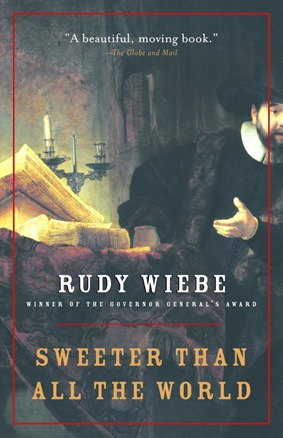Description
Rudy Wiebe’s latest novel is at once an enthralling saga of the Mennonite people and one man’s emotional voyage into his heritage and his own self-discovery. Ambitious in its historical sweep, tender and humane, Sweeter Than All the World takes us on an extraordinary odyssey never before fully related in a contemporary novel.
The novel tells the story of the Mennonite people from the early days of persecution in sixteenth-century Netherlands, and follows their emigration to Danzig, London, Russia, and the Americas, through the horrors of World War II, to settlement in Paraguay and Canada. It is told episodically in a double-stranded narrative. The first strand consists of different voices of historical figures. The other narrative voice is that of Adam Wiebe, born in Saskatchewan in 1935, whom we encounter at telling stages of his life: as a small boy playing in the bush, as a student hunting caribou a week before his wedding, and as a middle-aged man carefully negotiating a temporary separation from his wife. As Adam faces the collapse of his marriage and the disappearance of his daughter, he becomes obsessed with understanding his ancestral past. Wiebe meshes the history of a people with the story of a modern family, laying bare the complexities of desire and family love, religious faith and human frailty.
The past comes brilliantly alive, beginning with the horrors of the Reformation, when Weynken Claes Wybe is burned at the stake for heretical views on Communion. We are caught up in the great events of each century, as we follow in the footsteps of Adam’s forebears: the genius engineer who invented the cable-car system; the artist Enoch Seeman, who found acclamation at the royal court in London after having been forbidden to paint by the Elders; Anna, who endures the great wagon trek across the Volga in 1860, leaving behind her hopes of marriage so that her brothers will escape conscription in the Prussian army; and Elizabeth Katerina, caught in the Red Army’s advance into Germany when rape and pillage are the rewards given to soldiers. The title of the novel, taken from a hymn, reflects the beauty and sorrow of these stories of courage. In a startling act of invention, Sweeter Than All the World sets one man’s quest for family and love against centuries of turmoil.
Rudy Wiebe first wrote of Mennonite resettlement in his 1970 epic novel The Blue Mountains of China. Since then, much of his work has focused on re-imagining the history of the Canadian Northwest. In Sweeter Than All the World, as in many of his most acclaimed novels, Wiebe has sought out real historical characters to tell an extraordinary story. William Keith, a University of Toronto professor and author of a book about Wiebe, writes: “Wiebe has a knack for divining wells of human feeling in historical sources.” Here, all the main characters share his name, and the history is one to which he belongs. Moreover, alongside those flashbacks into history is revealed an utterly compelling contemporary story of a man whose background is not totally unlike the author’s own. Wiebe sets his narrative against his two favourite backdrops: the northern Alberta landscape, and the shared memories of the Mennonite people. Sweeter Than All the World is a compassionate, erudite and stimulating work of fiction that shares the deep-rooted concerns of all of Wiebe’s work: how to make history live in our imagination, and how we can best live our lives.
About the Author
Wiebe was born at Speedwell, near Fairholme, Saskatchewan in what would later become his family’s chicken barn. For thirteen years he lived in an isolated Mennonite community of about 250 people. He did not speak English until age six since Mennonites at that time customarily spoke Low German at home and standard German at Church. He attended the small school three miles from his farm and the Speedwell Mennonite Brethren Church.He received his B.A. in 1956 from the University of Alberta and then studied at the University of Tübingen in West Germany. In 1958 he married Tena Isaak, with whom he had two children.He is deeply committed to the literary culture of Canada and has shown a particular interest in the traditions and struggles of people in the Prairie provinces, both whites and Aboriginals.Wiebe won the Governor General's Award for Fiction twice, for The Temptations of Big Bear (1973) and A Discovery of Strangers (1994). He was awarded the Royal Society of Canada's Lorne Pierce Medal in 1986. In 2000 he was made an Officer of the Order of Canada.
